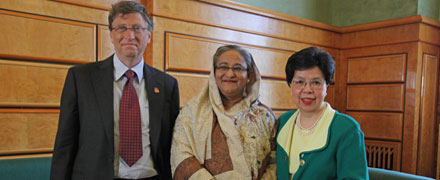Day 2 of World Health Assembly: International Health Regulations and WHO reform in focus

WHO/Pierre Albouy
International Health Regulations
Over 40 countries took part in discussing the implementation of the International Health Regulations (IHR) yesterday. There was general agreement that the IHR have provided a very valuable and effective global framework for sharing information and coordinating responses to health issues at the international level. Delegates requested more guidance from WHO on specific elements of the IHR, including chemical and nuclear events and implementation at points of entry (ports, airports and ground crossings), and additional support in training and monitoring progress.
WHO reform
Reform is essential to ensure that WHO retains its leadership in global health, said Dr Margaret Chan, WHO Director-General. Many countries pledged strong support for the Director-General’s proposal, and identified some key elements of this reform: clarification of the roles of WHO headquarters and regional and country offices; more flexible financial contributions; and greater focus on performance and accountability.
Guest speakers
Mrs Sheikh Hasina, Prime Minister of Bangladesh, spoke yesterday, noting health and development targets she has set for Bangladesh to become a middle-income nation within the next 10 years, and proclaiming “health is wealth”. Mr Bill Gates, Co-chair of the Bill & Melinda Gates Foundation, called for increased political and financial support for vaccines so that, “by 2020, we can prevent 10 million deaths”.
Some highlights for the European Region
Ms Zsuzsanna Jakab, WHO Regional Director for Europe, met with delegations from:
- Serbia, to discuss government action to address health inequalities faced by the Roma population;
- Germany, to discuss the environment and health process in Europe;
- Portugal, to discuss on health system reform and the positive impact of new national legislation on tobacco; and
- the Netherlands, to discuss its partnership agreement with WHO
Dr José Martin-Moreno, Director, Programme Management at WHO/Europe, presented a report to the Minister of Health of Belarus on the current status and future direction of breast and cervical cancer prevention in the country.
Delegates of European countries – including Belarus, Germany, Iceland, Israel, Kazakhstan, Luxembourg, Monaco, the Republic of Moldova, Poland, Slovenia, Spain, Sweden, Ukraine and Uzbekistan – spoke in plenary.



